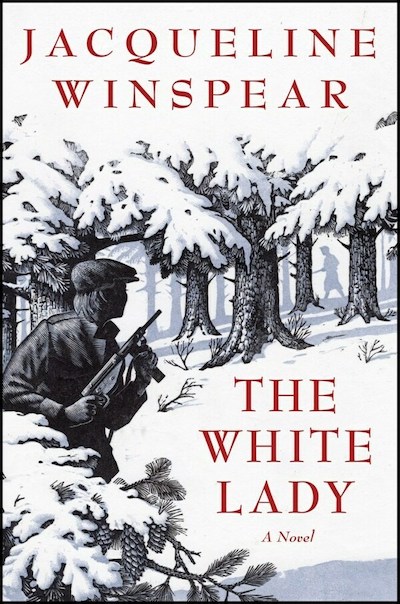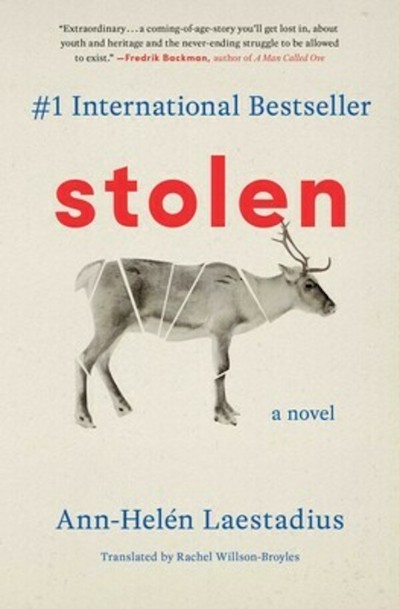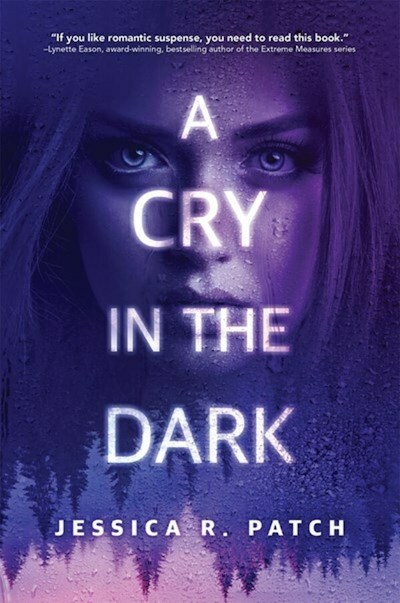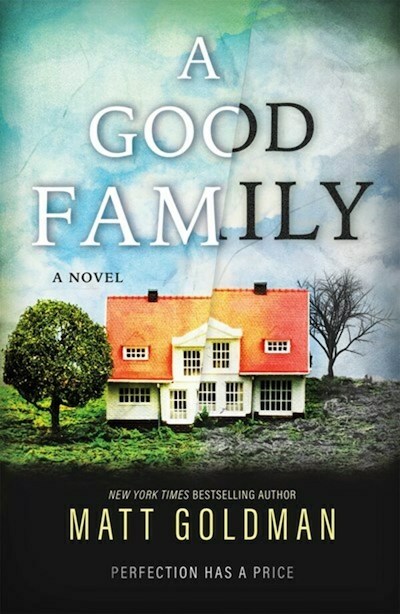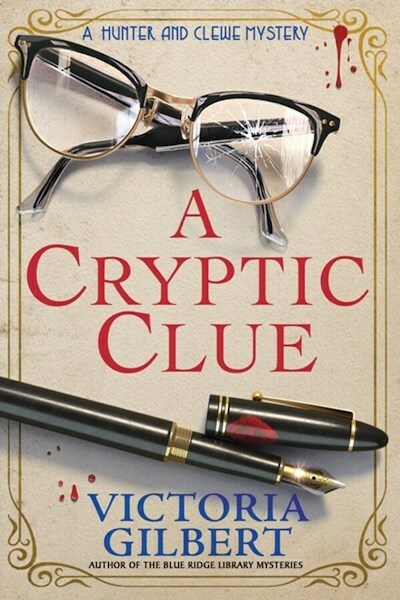Jacqueline Winspear, author of the hugely popular mystery Maisie Dobbbs series set in England during WWII, here moves into the post-war world with a new heroine. Elinor White has had a lifetime of espionage. Born in Brussels, daughters of a British mother and a Belgian father who died in the early years of the WWI, she and her older sister spent WWI in Brussels, working as trained spies, going so far as derailing German supply trains in the dead of night. By age 14, already an expert markswoman, Elinor moves with her family to England. But by the beginning of WWII, she’s back in the espionage game, although eventually a terrible injury behind enemy lines sends her back to England and a lengthy hospitalization. When the war finally ends, she moves to the country, promising to forget the past and live a life of monotony. But when the lives of a neighboring family are threatened—they too are seeking anonymity—Elinor becomes involved, facing the country’s largest crime family head on. Throughout, readers will sense that Elinor is keeping something from us, and when her secret is finally revealed it brings about a type of healing. As always, Winspear is brilliant at bringing us into the past and into the lives of women, so often left out of accounts of war efforts. Winspear fans will find much to enjoy here, as will other readers of historical fiction.
Review
Elsa knows you have to keep your hands in the sled so they’re not sliced by sharp ice. She’s learning to sew gákti, her Sámi family’s traditional clothes. She’s even big enough to surprise her parents by skiing to the reindeer corral and feeding the animals by herself. But one day, when she gets there, in the opening of this unusual and immersive novel, Nástegallu, the reindeer her father has given her as her own, has been murdered. More terrifying, the killer stares at Elsa and draws his finger across his throat to show that she’d better keep her mouth shut. The lonely terror triggered by this gruesome event seeps into Elsa’s bones and shapes her life for the decades spanned by the book. As a frightened child and later a fledgling Sámi-rights activist, Elsa stands on the tenuous border between the indigenous reindeer herders who are trying to maintain their traditional way of life and the more modern Swedes around them who treat the “bloody Lapps” (Lapp is a slur) as either entitled leeches on the state or quaint artifacts of pastoral innocence. Always at the center are the reindeer and the serial killing of them, a destruction of Sami food, transport, heat, and sense of self. A reindeer serial killer? I know. But this is one of those books that will draw you in, teach you, and stay with you. Sámi journalist Laestadius’s adult debut, this book won Sweden’s Book of the Year prize in 2021 and is being adapted into a film that will be on Netflix in 2024
Vivvy Bouchet—the last name is one her mother made up as fitting for a psychic—is an astrophysicist who’s working to prove that a glimpse of far, far off light she once detected is artificial light from extraterrestrial life. There’s serious grant money in the balance, but she’s pulled further and further from her day job by her side gig as a psychic working with an old friend (it’s complicated), Mike, who’s a cop. Mike and his gruff, hostile coworker want Vivvy’s take on the case of Lizzie, a missing girl. Lizzie’s mother is in jail for the girl’s murder, but swears she’s innocent, and Vivvy gets a vision that there’s more to the situation than the police know. Discovering Lizzie’s fate and who’s responsible begins to take over Vivvy’s life, not only because she’s determined to find the girl but also because an Alex Jones-type radio and podcast host starts making her life a misery. Getting his fans away from her home and getting back to her research, if her colleagues can ever take her seriously again, are the goals. But Vivvy’s relationship with Mike isn’t the only complication, making this a maelstrom of worldly and otherworldly detective work, satisfying twists, and relationship drama. A fast-moving thriller with an unusual protagonist.
Having loved Nonna Maria and the Runaway Bride, I started Carcaterra’s second in the series with some trepidation. Would it hold up to the first? But I’m happy to report that the newest Nonna book provides all the pleasures of the earlier title—and then some. If you aren’t familiar with Nonna Maria, then make it a point to remedy that. A widowed grandmother, Nonna Maria, in an oh-so-subtle way, runs the island of Ischia, just 20 miles from Naples. Through her myriad connections, which include the carabinieri, members of organized crime, the clergy, and of course family, Nonna rights many wrongs—all while cooking the most delectable meals. In this installment, Nonna Maria’s goddaughter, who works as a maid, is accused of stealing a necklace while a woman, who was once a native, returns to the island, only to be murdered. Through Nonna’s investigations, we learn more about how the island, and its economy, is changing, while the conservative social mores that are such a part of island life live on. Cozy readers will love this book both for the indomitable character of Nonna Maria and the chance to travel to this paradise in the Bay of Naples.
A powerful coming-of-age novel that gradually, and brilliantly, morphs into crime fiction. Sarah Taylor didn’t apply to the prestigious, all-girl prep school Saint Ambrose. Her mother—and sole parent—who works as a lunch lady and barely has $200 in the bank, completed her application. “You’re nationwide smart, Sarah, not small town bright,” her mother reminds her when dropping her off on the first day. But Sarah, dressed all in black, with hair dyed to match, isn’t exactly fitting in at Saint Ambrose, and her diagnosis of bipolar with mania doesn’t help. But the worst is queen mean Greta, who, along with her court, goes after Sarah, humiliating her whenever there’s an opportunity—including Xeroxing and distributing a very personal essay Sarah wrote about being diagnosed bipolar. But slowly Sarah starts to build alliances, including “hot RA,” her incredibly handsome resident advisor, and Strots, her privileged, tough as nails, super-jock roommate, who’s gay and has her own set of challenges (the novel’s set in 1991). Serious stuff, but Sarah has a wild sense of humor that keeps you glued to the page, and the depiction of a New England prep school is spot on. Tensions mount, hatreds grow, violence is inevitable, the community becomes unglued, and readers are left gasping. As Sarah says: “There’s going to be no setting what just happened to rights. Ever.” Fans of Donna Tartt’s The Secret History and Rebecca Makkai’s forthcoming I Have Some Questions for You will love this.
Christian fiction readers and those who enjoy a chilling, tense thriller will relish the trip to Night Hollow, a desolate part of rural Kentucky that locals call “the holler.” Set deep in Appalachian hills, the holler is darker than its surroundings, in both meager daylight and social conditions. It’s particularly bad for women, but the holler keeps all its residents in its sad grip, while outsiders leave the poverty and crime to continue providing it stays contained. That ends when the FBI shows up to investigate the murder of several local women who’ve been found beaten and with their eyes removed and eyelids sewn shut (a process that happens “offstage,” thankfully). Two very different protagonists lead the story: FBI psychologist Violet Rainwater, who’s a product of her mother’s lengthy abduction and rape years ago and struggles to face the current crime’s echoes of that past, and John Orlando, a detective whose FBI-agent wife’s killing may have a link to the Blind Eye Killer, as the media has dubbed the area’s monster. Patch offers spiritual insights via believer John’s kind advice and support of atheist Violet, with the religious theme taking a back seat to the characters’ personalities and the layered mysteries that swirl in the holler. The scary ending, which also has a great twist, will leave readers ready for more from Patch.
Katie Kuhlmann lives in an Edina, Minnesota, neighborhood called Country Club, and it’s like what you would imagine. Katie didn’t grow up rich, but she married old Minnesota money and now lives among neighbors who might “chip in on a private jet” so they can all vacation in the same luxurious place. Having endured a sad upbringing with her grandparents after her parents and brothers were killed in a car crash, Katie’s happy to roll with the pampered oddness that is her new life as long as she’s got her family close. But her safe haven is beginning to show signs of rot. When he’s not ignoring his family or disappearing for lengthy stretches, Katie’s husband, Jack, is angry and tense. Out of the blue, a wayward college friend of his arrives and takes up residence in the family’s garden apartment, and Katie fears that things are going from bad to worse. She has no idea how dire things will get and the gut-punch of betrayal that’s in store. When her husband confesses a crime to her—is it even true?—it’s just the beginning. Goldman writes a woman’s inner voice perfectly, and his background as a TV writer (Seinfeld, Ellen) shows on the page, with tense and thrilling scenes quickly alternating with romantic interludes and domestic entanglements. Jodi Piccoult readers will enjoy Katie’s climb out of a painful trap.
A former university librarian, forced into early retirement, takes on a new job cataloging a book collection, only to find herself spending more time solving a crime than applying the Library of Congress subject headings. Jane Hunter is making lots of changes in her life. She’s downsized her home, is living alone—her actress daughter is off on a national tour—and is about to bring in some much-needed funds by cataloging 33-year-old Cameron “Cam” Clewe’s vast crime fiction collection. But on the first day at the job, at Cam’s sprawling mansion, she discovers—wouldn’t you know it?—a corpse on the floor of the library. And not just any corpse. Cam’s latest ex-girlfriend. To make matters worse, several people saw the couple arguing the night before. With handsome Cam the number one suspect, if Jane wants to keep her job, she’s got to keep her boss out of jail, so the two team up to find the real perp. The fun here is in what an odd couple they make. Sherlock Cam has “anxiety, OCD, occasional depression, and a general lack of social awareness.” And while Watson Jane may not have been diagnosed with anything listed in the DSM-5, she’s darn nosey, quite pushy, a bit of a rumor monger, and has some dubious professional ethics (she brings items home, and shows them to a neighbor, without Cam’s permission.) Everything is in place here for a successful series sure to delight traditional cozy readers for years to come. Now let these two go at each other.
A wonderful, moving stand-alone in which Sutanto, author of the Aunties series, is at the absolute top of her game. Sixty-year-old Vera Wong is lonely, although she’d never admit it. A widower, she’s the mother of a lawyer consumed by work—he rarely returns her texts, even though she offers such good advice!— and her days consist of a 6 am brisk walk through San Francisco’s Chinatown—she needs to get her steps in!—then opening her tea shop which, on the best of days, has only one customer. Extraordinarily opinionated, quite a bit eccentric, yet utterly charming, Vera’s voice is captivating. But readers will be completely beguiled after she comes downstairs one morning (she lives above the shop) and discovers a young man lying on the floor. She does call the cops, and tries her very, very best not to disturb the crime scene, but not before prying a flash drive out of the man’s very dead hands. Then the novel takes off as Vera—believing the cops are incapable of solving the crime—assumes the role of detective. In the process, she befriends several young people, including both the victim’s wife and his brother, and while Vera still considers them all to be prime suspects, she can’t help but care for them. Initially this protagonist may seem like the cliché of the dominating Chinese mom. But Vera, it turns out, is pretty damaged herself, much like her new, thirty-something friends. Come for the mystery, but stay for the healing. One of the best cozies I’ve read this year.
Yes, it’s only October. But my money is on Bad Summer People as the best beach book of the summer of 2023. Set in Salcombe, a made-up community on Fire Island—not the like the gay Pines, more the reclusive and ritzy Saltaire—this book, in the great literary tradition of Peyton Place, has it all: adultery, fashion, tons of gossip, backbiting, lying, hot sex with the tennis pro, tasteful plastic surgery, alcoholism, and even a corpse. Plus the sort of casual racism and classism liberal one-percenters indulge in. It opens with a prologue, set at the end of August, in which a body is discovered face down off the boardwalk. The book then backs up to late June, as the all-white residents arrive from the Upper East side and Scarsdale for the start of a new season. From there we follow the tumultuous summer in chronological order, moving quite handily among a group of narrators, from the above-mentioned Stanford tennis coach to the Filipino nanny to the gay Yale student/bartender and many more. At the gravitational center of the book are Jen Weinstein and Lauren Parker, the “it moms” who married into Salcombe—their husbands are best friends—and oversee the social action. Not another word from me, lest I spoil any of the fun, except to say the identities of both the victim and the murderer pack quite the punch. This book really hits the sweet spot for popular fiction and will appeal to a broad swathe of readers.

